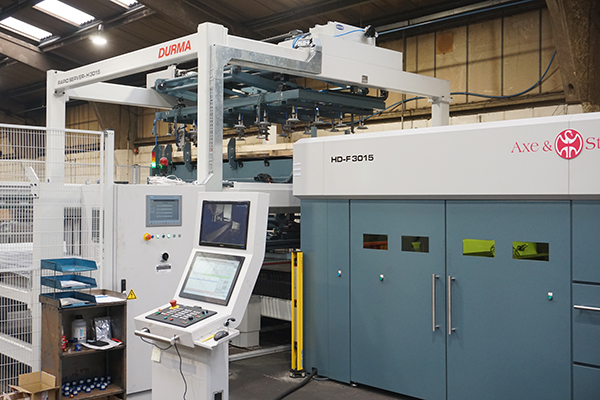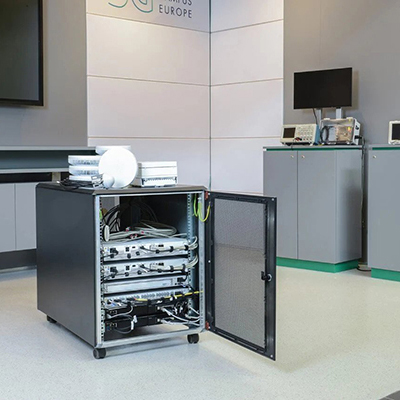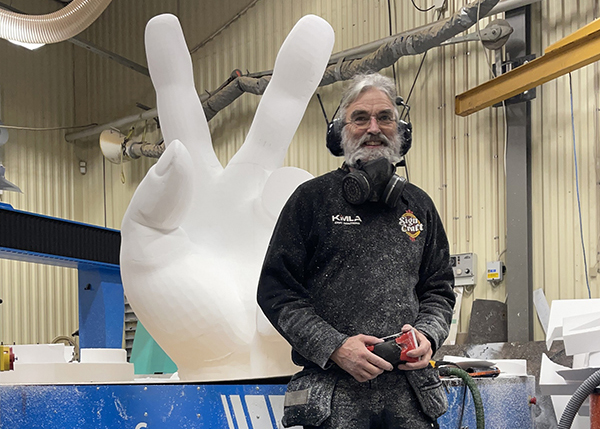
Impulse Point of Purchase, a designer and manufacturer of award-winning POP displays across a number of industries, has invested in a new Durma HD-FL 3015 fibre laser cutter with automated loader from Axe & Status. The machine is delivering a 30% increase in speed on thinner-gauge materials, and around 10% on average across all thicknesses, providing a notable impact on bottom-line profitability.
Based in Sandy, Bedfordshire, Impulse POP draws upon many decades of experience in the provision of end-to-end engineering, manufacturing and installation services to retail segments that include sport, music, fashion and jewellery, food and drink, health and beauty, and DIY and gardening. Each solution provides brands with highly effective merchandising opportunities.
Mark McKeown, a man with over 30 years of experience in the POP sector, established the business in 2005. After just three years, the company moved into its current 10,000 sq ft facility and has since grown into a £1.5m turnover business.
“We’re still smaller than some of our competitors but we offer a first-class tailored service,” he says. “We provide an intimacy with our customers that is often missing with many of the larger market players. Our customers use us because they know we can solve their problems.”

The in-house production capabilities of Impulse POP are a major advantage when it comes to winning new contracts, which is why the company insists on regular investment to keep pace with the latest manufacturing technologies. “We had a CO2 laser cutter from another supplier and, although there was nothing wrong with the machine, we knew that investing in a fibre-based solution would bring a number of important advantages,” says McKeown. “I see a laser cutter as a workhorse and, although we scrutinised many machines, we couldn’t see sense in spending top dollar unless we could really monetise that value. We have Durma press brakes, as well as a corner notcher and a guillotine, so it was a proven brand for us. The Durma HD-FL 3015 fibre laser cutter soon became the clear favourite. We also wanted a loader/unloader so we could work unmanned during the day and lights-out overnight.” Installed in October 2021, such is the confidence in the new automated Durma fibre laser cutter that Impulse POP dispensed with its previous CO2 machine.
“We had a couple of teething issues, which is normal, but Axe & Status, including the team from Durma in Turkey, reacted very quickly,” states McKeown. “I’m very happy with the support we received and I really like the machine; it was absolutely a good decision from our perspective.”
The majority of the material that Impulse POP processes is mild steel (for its display customers), but the company also runs aluminium and stainless steel. In addition, the introduction of the Durma fibre laser means Impulse can run copper and brass if needed.
Typically, the company works with material thicknesses from 1 to 12 mm. Impulse selected the 4 kW Durma HD-FL 3015, which can process mild steel up to 20 mm thick, stainless steel up to 10 mm, and aluminium up to 12 mm. However, versions up to 20 kW are available if companies want to cut even thicker materials. The HD-FL 3015 offers 3060 x 1530 x 160 mm in the X, Y and Z axis respectively, although models up to the HD-F 16030 are available from Axe & Status with travels that extend to 16200 x 3100 x 185 mm. Control is via Sinumerik 840D SL with 19” touchscreen.

“We design everything in SolidWorks and use Lantek as our programming software, from where the Durma laser pulls jobs as required over the network – we simply press the start button,” explains McKeown. “Once cut, we bend, weld and finish the parts accordingly.”
A good example of the work that Impulse POP handles is a display completed recently for Candy King, a leading supplier of pick and mix sweets, which wanted 950 units for the UK’s entire portfolio of One Stop convenience stores. This attractive POP solution featured a 1.2 mm mild steel body produced on the Durma laser, with the full assembly undergoing welding, powder coating and the application of branded transfers.
“It was amazing to watch this job on the laser,” states McKeown. “It took just 90 seconds to cut a full sheet of three display bodies, which was very fast. Within 10 hours we had completed the entire 950. Running the job on our new fibre laser with automated loader/unloader was quicker than using our previous CO2 machine, so it gave economies of scale. The Durma is at least 10% faster on average. However, for thinner work, such as the 1.2 mm mild steel display for Candy King, it’s more like 30% quicker.”
The Durma HD-FL 3015 fibre laser cutter features a linear motor motion system that delivers very high acceleration (synchronised 35 m/s2), speed (synchronised 226 m/min) and positioning/repeatability (±0.03 mm). The savings that Impulse POP accrues from the additional speed are supplemented by its use of compressed air as the assist gas.

“This strategy works really well on thinner materials,” says McKeown. “As long as the air is clean, it’s effectively free because we’re running our compressor anyway. We ran compressed air for the Candy King job, which probably saved around £150 of nitrogen. I also like the zero warm-up time with fibre technology. We would previously wait around 20 minutes for our CO2 laser to be ready.”
Being a full service provider with fast manufacturing technologies is key to success at Impulse, which is capable of supplying quickly and efficiently across a wide range of materials, including metal, wood and acrylic. Temporary and permanent retail displays, as well as in-store, pop-up, event and exhibition display stands, are all within the team’s in-house capabilities.
Notably, the Durma laser not only delivers short cycle times, but outstanding quality and flexibility in manufacturing, all of which bodes well for a bright future. “Of course, certain challenges remain, not least the fact that metal prices have doubled since the onset of the pandemic,” concludes McKeown. “What’s more, energy prices are rising almost constantly and transport companies are hitting us with surcharges to cover their growing fuel bills. All of this makes costing tricky. However, we are renowned for our problem-solving and we’ll find a way, particularly with the help of our new Durma laser cutter. Investment remains key to our ongoing success.”
For further information
www.axestatus.com























